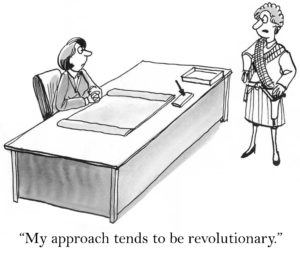I truly believe that the single biggest asset any company has is not whatever product or service they provide, not physical equipment or buildings and not clients or accounts receivables, it’s the people that work for the company.
It doesn’t matter whether you are first to market with an idea as someone will be nipping at your heels very soon. It doesn’t matter if you have a long client list or worked with these clients for years. Everything you enjoy as success and place value on can explode if you don’t have the right people, in the right roles within your company.
You know this, everyone really knows this and yet how often do we focus on keeping the talent we want? Are you nurturing and growing your best and brightest or are you allowing them to be lured away by your competition? Isn’t it difficult enough to find the right people for your company, onboard them and get them up to speed without losing them 2, 3 or 5 years later to your competitor?
I owned a recruiting firm for over 20 years. I promise you very few people I interviewed were considering other opportunities because they felt underpaid. In my years as coach and consultant, while employees always think they are underpaid, no one has left any company that I am aware of because of compensation. It’s a whole host of other factors. And a secret I will share with you is, even if someone isn’t actively looking for a new position, they will periodically get tapped on the shoulder by a recruiter. Once they have talked to the recruiter and gone on an interview, they will continue to interview, even if they hadn’t before the recruiter contacted them. You cannot recruit someone that doesn’t have something missing from their current situation.
So if it isn’t money, what does keep employees happy? There are some obvious ones, and a few I will share that are less obvious and very important.
The more obvious employee retention strategies include:
- Promotional opportunities
- Training and skills development
- Flexibility on schedules
- Benefits and compensation – even though compensation won’t keep people from leaving the combination of benefits and compensation can make a difference.
The less obvious strategies include:
Opportunities: This is not a repeat of above, it’s about offering opportunities that they want, not what you think is best for them or the company. Just because you provide an opportunity for a leadership role or something else, does not mean they are interested. Pay attention to what they tell you they want!
Communication: You can’t determine what they want for themselves without asking. Performance does not improve without communication. Closed doors and suggest you aren’t accessible. The point is that people want to know where they stand in terms of their performance, they want to know what is happening with the company that could affect them and they want to know that you care enough about them to find out what’s important to them personally and professionally.
Physical Environment: This isn’t about having 5-star work areas. When I talk about the physical environment I mean making sure the temperature is reasonably comfortable. I worked for a company where my desk was under a vent and I had to wear a coat every day it was so cold. They wouldn’t move my desk and a year later I left them. Look around your office and see what doesn’t give you the feeling that you would like.
Flexibility: This isn’t about working whenever they want, but about offering enough flexibility for them to manage their personal life and work life effectively. Do they need to be in the office at 8:30 because their role requires it or would 9:30 work just as well? And if they have to leave at 4:30 for a doctor’s appointment do they have to take a half day of PTO because that’s what the handbook says?
Treat them like adults, expect them to act according. It includes the flexibility I described in #4, but also not micro-managing, allowing failure, allowing creativity and freedom of thought. Do you think you would have chaos if you eliminated sick days and told people just stay home when you’re sick and it doesn’t count toward PTO? The list of possibilities are long.
Mentor, coach and mentor, coach some more. Training is important but the opportunity to have someone they trust to take them under their wing and mentor and coach them is invaluable to people. Tell them where they are brilliant, and where they need development. Support them when they stumble, and give them the tools to be successful. Be their biggest advocate and supporter and act as the tough love parent when necessary.
What everyone wants is to feel valued, cared for, respected and appreciated for the work they do. Some things you might not have control over such as benefits or salary and you do have control over how you treat them. What’s the common denominator in the six strategies I listed above? They all involving demonstrating that you care about them as people, not just as a body in the seat at your company or what they can do for you.
Zig Ziglar said it best. “You can have everything you want if you help enough other people get what they want.”

Are You the Leader
You Want to Be?
Are you the style of leader you think you are? Take the leadership quiz and find out your leadership style.
You’ll learn what impact your particular style has on performance, productivity and satisfaction of the team.









